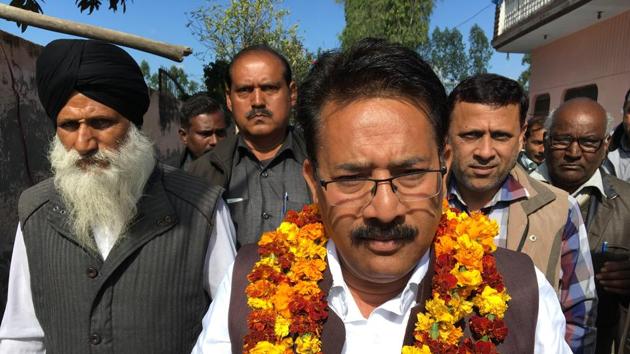UP Election: In Mahabharat land, now a reserved seat, Dalits woo non-Dalits
It was central to the battles. between the cousins in the Mahabharat epic. But today, Hastinapur is witnessing a different kind of electoral battle - where Dalit candidates are competing with each other to woo non-Dalits.
It was central to the battles. between the cousins in the Mahabharat epic. But today, Hastinapur is witnessing a different kind of electoral battle - where Dalit candidates are competing with each other to woo non-Dalits.

And in that lies the paradox of a reserved seat.
While only Dalits can compete, it is the Dalit who is most popular among non-Dalits who has the edge in an electoral contest. B R Ambedkar has foreseen this eight decades ago and was uncomfortable with the fact that this would give, once again, power to the other communities - which is why he insisted on separate electorates, a demand Gandhi opposed.
Reserved seats are a good barometer to judge overall electoral mood - for in 2007, BSP won a majority of the 85 SC seats and in 2012, SP bagged the majority. To understand how politics in reserved seats is playing out in the UP elections, HT travelled with BSP candidate, Yogesh Verma, through the historic town of Hastinapur in Meerut district.
Tackling demographics
Sitting in a large SUV as he sets out on the campaign trail, Yogesh Verma reels off his electoral history. He had won on the BSP ticket in 2007. Internal rivals convinced Mayawati to drop his ticket in 2012. So he stood on a Peace Party platform, and came a close second. And that persuaded Behenji to consider him again.
Like all MLA candidates, Verma first explains the constituency demographics - 70,000 Dalits; 75,000 Muslims; 50,000 Gujjars; 22,000 Jats; 9000 Bengalis; 9000 Sikhs; 8000 or so Pals, Sainis, Prajapatis, Kashyaps, Yadavs and Tyagis each; 8000 Brahmins and a few thousand Thakurs. On the campaign trail, this is how most candidates frame their understanding of constituencies, and devise strategies.
Verma says that within Dalits, there are 60,000 Jatavs and 9,000 or so Valmikis. “I am a Jatav and I am on BSP ticket. So most Dalits will vote for me in any case.” The SP candidate is a Valmiki, the BJP candidate is a Khatik, and the RLD has unleashed an interesting experiment. They have put up the Dalit wife of a Gujjar man as candidate, hoping to win Gujjars by terming her as their daughter in law and Dalits as their daughter. Verma scoffs at this, “All this will not work. Dalits are with Behenji.”
Wooing the others
But the real battle is for other votes. And so that is why Verma’s first stop is a Sikh dera - where he speaks about roads he had constructed as MLA, about the bridge that was not constructed by his successor. He then rushes to a Thakur village - and speaks of Mayawati’s ‘bhaichara committee’ and ‘sarvajan’ samaj concepts meant to accommodate upper castes.
“Behenji has leaders of other communities with her. So they are often deployed to reserved seats to work on their own community votes to convince them,” explains Verma. So Mayawati aide Satish Chandra Mishra has been spending time in Brahmin pockets of reserved seats, senior leader Nasimuddin Siddiqui invests time with Muslims.
This Muslim vote is crucial to BSP success in this election, for it can sense that upper castes in west UP in particular may not vote for them and veer towards BJP.
So in Bali village, Verma is greeted by a crowd of Muslims. Dilshad Khan, a local leader, builds up the case for BSP. “Under Akhilesh Yadav, Muzaffarnagar riots happened; under Mayawati, it did not. Under BJP and SP rule, Akhlaq happened; under Mayawati, it did not.” He then cites the statements of Yogi Adityanath and Sakshi Maharaj to tell Muslims this is their moment to pay back. Verma echoes the slogans, and argues only BSP can defeat communalism.
Verma is billed as the favourite to win Hastinapur. A supporter says he is ‘dabang’, an aggressive candidate. He has wealth - when asked about his businesses, he replied, “Property but not in my constituency’. And he has demographics in his favour. But whether his success will extend to the party’s overall success is the big question of UP 2017.




